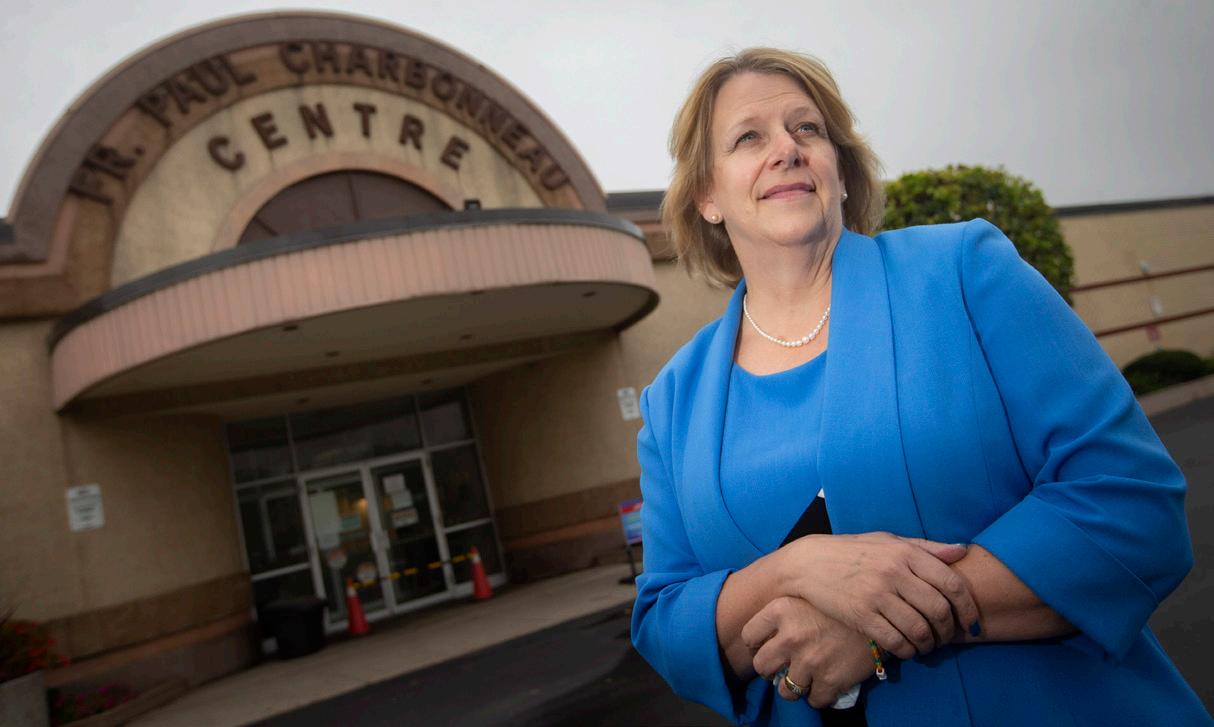
3 minute read
Nurses have ‘robust understanding’ of mental health and addictions treatment
Anna Cabrera
Over the years, the nursing profession has come a long way in terms of recognizing the importance of mental health and addiction recovery. It’s evolved to include more specialized training to better serve patients struggling with mental health concerns and addictions.
Advertisement
According to Elizabeth Dulmage, executive director at Brentwood Recovery Home, nurses have always been incredibly compassionate and sensitive to the needs of those challenged with addiction. They walk side by side with their patients on their road to recovery.
to work alongside our addictions physician to manage some of what we call opioid agonist therapy, which is part of a harm reduction strategy.”
Dulmage observes that early in her career as a public health nurse, a common practice was for nurses to visit people with diagnosed mental illness at home. Today, she says, “the level of complexity, and our increased knowledge of how much of a role trauma plays in addictions has really influenced how much we, as nurses, and the health-care community as a whole, pay attention to the biology, psychology and the spirit of the client who we’re serving.
“There’s a myriad of different substances we’re dealing with. We have a very concerning level of homelessness. There are unknown substances that are contaminating the drug supply,” she says.
It’s not a character defect. It’s not a choice. These people truly are ill. And nurses can see that.
But Dulmage says that today’s nurses are even more aware of the plight of those struggling with addiction, and are more prepared to help their patients, even though the ailment remains largely misunderstood by the public.
“Mental health is definitely coming to the forefront, but from the perspective of those in the nursing profession, most audiences haven’t really yet come to understand what it takes to manage and to help people in recovery, and what (addiction) even really is,” she says. “As nurses, some of the challenges that present for us, both from the treatment and resourcing point of view, is that mental (illness) comes with stigma and misperceptions, and even within the healthcare system, tion) are truly illnesses and may require prescriptive treatments and a robust understanding of treatment,” she adds.

“There’s a complex physiological and neurophysiological component that contributes to these diseases… it’s not a character flaw. It’s not a character defect. It’s not a choice. These people truly are ill.
“And nurses can see that.”
Dulmage shares that for many suffering from addiction, physical ailments are “a real manifestation – like anybody else experiencing something physical, they may be recovering from one thing, and some other ailment occurs. It’s the same thing for people recovering from addiction,” she says.

“But in many cases, because of the nature of this disease, they’ve not had good primary care.”
At Brentwood, Dulmage explains that nurses are ready and waiting established a medical mobile clinic with the Windsor-Essex Ontario Health team, which is “an amazing partnership,” says Dulmage.
“They’re here once a month and provide many of the primary care might be that they say, ‘This client needs to have their blood pressure looked at,’ or ‘this client has some skin wounds that need to be attended to,’ or ‘this patient has some digestive tract issues.’






“For our nurses,” she says, “it’s about ensuring that they have support, to work with primary care to address any needs and medications,
“And the results can be deadly. So on our part, we have had to employ some really aggressive treatments, and as a nurse, it can be very hard to see. But our goal is to support a person in being able to maintain being clean and sober –so no matter how sad, it can be incredibly rewarding.”
Tracey Seguin, a registered practical nurse at Brentwood, agrees. But she says that while the changes she’s seen over her 30 years as a nurse have been alarming, there’s a light in the darkness.
“You know what’s been most gratifying to me as a nurse? It’s to see the people get well,” says Seguin, an alumna of the Brentwood program.
“If you look at people’s faces when they walk in, if you were to take a picture of them and look at their (medication) sheet, it’s a totally different picture after we’ve worked with them,” she says.
“Their faces change. They start doing their hair again. You can physically see their self-worth improving.
“For me, as someone who’s both a nurse and someone who’s been through it, there’s nothing like knowing you’re giving a person comfort, and ensuring them they’re not alone.”




